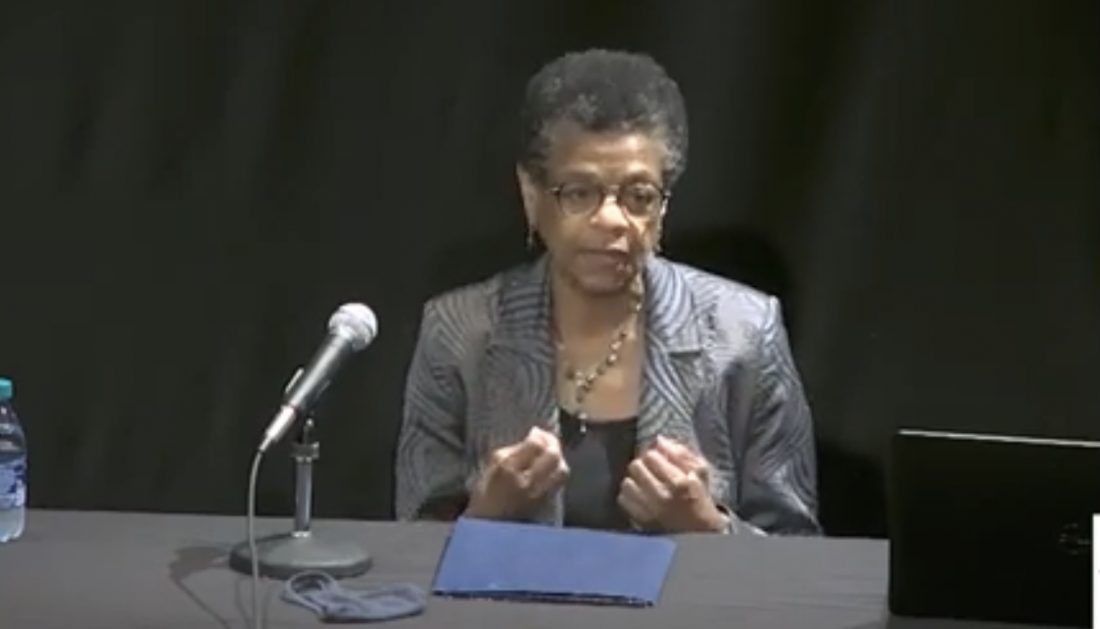Forum Provides Answers, Thoughts On Marijuana
- Penelope Hamilton Criscibene and Brent Issacson offered information during the forum on marijuana at the Fredonia Opera House. Photo by M.J. Stafford
- Dr. R. Lorraine Collins was one of four presenters during the forum on marijuana at the Fredonia Opera House.

Penelope Hamilton Criscibene and Brent Issacson offered information during the forum on marijuana at the Fredonia Opera House. Photo by M.J. Stafford
FREDONIA — One of the speakers at Wednesday’s marijuana legalization informational event at the Fredonia Opera House called the drug “a very complicated plant.” The issues presented by the state’s move to decriminalize sales and possession of it would also seem to be quite complicated.
Dr. R. Lorraine Collins, the University at Buffalo psychologist and associate dean of research who made that comment, noted that marijuana — which she prefers to call by its scientific name, cannabis — is still illegal under federal law.
“It’s very important people understand that,” she said. Collins added that “the challenges of doing research on cannabis are intense,” because she has to get approval from several federal agencies to do so.
On the state level, she noted that 36 states have provisions for legalized marijuana, but “each state has done its own thing and so the regulations vary tremendously.”
Collins was a member of the working group that former Gov. Andrew Cuomo put together to research cannabis legalization. She said it was a “thorough process” that led to a “reasonably good law” but that implementing the law “is where things could get a little sticky.” She went on to note that, with leadership positions in the new state Office of Cannabis Management just starting to get filled, marijuana will probably not be up for licensed public sale in New York until 2023.

Dr. R. Lorraine Collins was one of four presenters during the forum on marijuana at the Fredonia Opera House.
The sale of marijuana for recreational purposes will be subject to a 9% state sales tax and a 4% tax to be shared by the county and the local municipality, Collins said. An additional tax will be based on the amount of THC, the major psychoactive compound in cannabis.
As for medicinal marijuana, which has a much more developed infrastructure as it has been legalized longer, Collins stated, “There is no science behind the passage of medical marijuana.” She said advocacy, not backed by research, got medical marijuana passed in the states where it has been approved. Noting that the state’s own program allows sufferers of a host of conditions to apply, she said, “We do not have information to substantiate cannabis as a treatment for those conditions.”
Other speakers at Wednesday’s event included Penelope Criscibene, director of the Western New York chapter of national pro-legalization group NORML; SUNY Fredonia police chief Brent Isaacson; and Melanie Witkowski, director of the state-backed drug treatment center Prevention Works.
Criscibene presented her first experience with cannabis as a life-changing event. She said she had serious health problems, including an opioid addiction, until she took an “edible” (food infused with cannabis oil) at age 43. Her health problems eased and she stopped doing opiates within 30 days, she said.
“I began to learn and educate,” she said. “I dedicated my life to learning about this plant.”
She said she has discovered that most so-called “recreational” users of marijuana are actually doing it, at least partially, to help alleviate medical problems. Criscibene added that just as not everyone who has a liquor cabinet in their home is an alcoholic, not all marijuana users are “potheads.”
“We’re seeing it more and more as an exit drug,” a bridge for users of other drugs between addiction and a sober life, she said. On the other hand, “there is misuse, there is abuse, there are individuals who should never, ever touch cannabis.”
Isaacson said he wanted to limit his remarks to what is going on at SUNY Fredonia. He called marijuana use “generally a rare problem in our campus, anyway. … I’m not anticipating there will be a sea change.”
That’s because although the state has changed its marijuana policies, SUNY Fredonia has not, he said: it is still a violation of the student code of conduct to use or possess the drug on campus. Even before full legalization, Isaacson said students were generally more concerned about that than about criminal charges, because student code violations can lead to suspension or expulsion from the school.
Witkowski offered notes of concern about what legalization of marijuana will do to children. Stating she had teenage kids, she said, “I’m concerned for their safety. … It’s all about the kiddos.”
She called marijuana bad for adolescent brain development, decision-making and motivation, “These are our future employees we’ll be hiring, we have to protect them and keep them safe” she said.
Witkowski said 64% of Chautauqua County children do not perceive cannabis as harmful. “When they see a low perception of harm, they will increase its use,” she said.
Touting a Prevention Works campaign that seeks to stem cannabis, alcohol and vape use among the under-21 set, she said, “We need to protect our youth. They are our future.”






